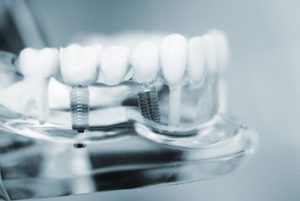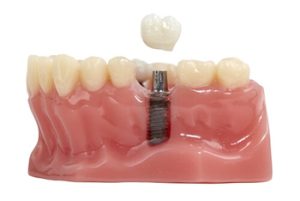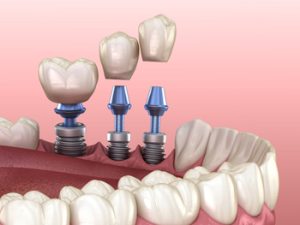Understanding the cost of a single tooth implant involves more than just looking at a price tag; it’s about considering the various factors that influence the final expense. Each patient’s situation is unique, making the cost variable depending on specific individual needs and conditions. While the financial aspect is an important consideration, it’s the underlying factors that largely determine the overall investment required. These factors encompass a range of elements, from clinical needs to personal treatment preferences. Before diving into the specifics, it’s essential to acknowledge how these diverse components interact to shape the cost of restoring your smile.
What Are Dental Implants?
Dental implants function as artificial tooth roots, typically crafted from titanium, providing a stable support for fixed replacement teeth. They are offered in various forms, including endosteal dental implants placed directly into the jawbone, and subperiosteal implants positioned beneath the gum but above the jawbone. These types cater to different patient needs and anatomical considerations.
What Is the Cost of Single Tooth Implants?
The single tooth implant cost generally begins at approximately $3,000, although this is just the initial amount. The actual cost can fluctuate depending on a variety of factors specific to the patient’s situation and the detailed needs of their treatment plan. For an accurate assessment and personalised costing, it’s advisable to consult directly with your dental practice.
What Are the Factors Affecting the Cost of a Single Tooth Implant?
Awareness of the cost of dental implants is critical for those considering this dental treatment. Single tooth implants offer a durable solution for missing teeth, but various factors can influence their overall cost. By examining these elements, patients can better anticipate the expenses involved and discuss their options with dental professionals.
Material and Type of Implant
 The materials used in the manufacture of the implant and the crown play a significant role in the overall cost. Titanium is commonly used for the implant due to its durability and compatibility with body tissues, while the crown can be made from porcelain, ceramic, or zirconia. The choice of material not only affects the performance and appearance of the implant but also the price.
The materials used in the manufacture of the implant and the crown play a significant role in the overall cost. Titanium is commonly used for the implant due to its durability and compatibility with body tissues, while the crown can be made from porcelain, ceramic, or zirconia. The choice of material not only affects the performance and appearance of the implant but also the price.
Dental Professional’s Expertise and Location
The expertise of the dental professional and the location of their practice can also impact the cost. Highly experienced dentists or those located in metropolitan areas often charge more due to their expertise and the higher operational costs associated with their locations. The complexity of the patient’s dental needs may require the skills of a more experienced dentist, which can increase the price accordingly.
Laboratory Fees and Additional Procedures
Laboratory fees for the custom creation of the implant crown can vary. Additionally, some patients might need preparatory procedures such as sinus lifts or dental bone grafts before placing the implant. These procedures are necessary to ensure the stability of the implant but add to the overall cost.
Dental Health Insurance Benefits
Patients with dental health insurance may find that their policies cover a portion of dental implants cost. Nonetheless, the extent of coverage can vary substantially depending on the insurance plan. It’s essential for patients to review their insurance benefits carefully to understand what portion of the dental implant costs could be offset.
Technology and Technique Used
The technology and techniques used during the implant procedure can also affect costs. Employing advanced imaging techniques, like 3D scans, for precise implant placement may come with added costs but can enhance the likelihood of achieving successful and satisfying results.
How Do Dentists Perform the Dental Implant Procedure?
Initial Consultation and Planning
The starting point in the implant procedure is a comprehensive evaluation of the patient’s oral health. During this phase, the dentist assesses the condition of the jaw bone to determine if it can support the implants. This might include X-rays or 3D imaging to map out the precise location for the implants.
Bone Grafting (If Required)
Bone grafting is a preliminary procedure that might be needed if the jaw bone lacks the density or volume required to support an implant. In this process, a piece of bone from another part of the patient’s body, or a special bone graft material, is transplanted into the jaw bone. This procedure aims to create a more robust foundation for the implant. It requires several months of healing before the actual implant surgery can take place.
Dental Implant Surgery
The core stage of the dental implant treatment is the implant surgery itself. Under local anaesthesia, this procedure is generally carried out. The dentist initiates with a small incision in the gum to expose the bone, followed by drilling a hole for the placement of the dental implant, a small titanium post.
Osseointegration Process
After placing the tooth implant in the jaw bone, a period of healing is required for osseointegration to occur. This process, where the jaw bone unites with the titanium implant, forms a durable anchor for the new tooth. The healing period can vary, generally lasting several months. During this time, patients are usually given temporary crowns over the implant sites.
Abutment Placement
Once osseointegration is complete, the next step entails the placement of the abutment, which serves as the link between the dental implant and the replacement tooth. This minor procedure is often carried out under local anaesthesia where the dentist reopens the gum to attach the abutment to the implant. The gum tissue is then given time to heal around the abutment, usually taking about two weeks.
Attaching the Prosthesis
After the gums heal, the final step of the dental implant procedure is the attachment of the artificial tooth or teeth. For a single dental implant, a custom-made crown is attached to the abutment. For patients missing multiple teeth or requiring full mouth dental implants, options like implant-retained dentures or multiple crowns are installed. This phase is crucial as it involves precise adjustments to ensure the new teeth fit comfortably and functionally.
What Are the Benefits of Single Dental Implants?
Single tooth implants provide several significant advantages over traditional methods like bridges or dentures, improving both functional and aesthetic aspects of a person’s dental health.
Natural Appearance and Functionality
 One of the most noticeable benefits of single dental implants is their natural appearance. Every implant is customised to match the colour and shape of surrounding teeth, ensuring they appear natural alongside natural teeth. This seamless integration helps to enhance a person’s smile and ensures that the replacement tooth fits perfectly within the dental arch. Moreover, implants are anchored securely into the jaw bone, which allows them to function just like natural teeth. This means that individuals can eat, speak, and smile with confidence without worrying about the stability of their dental work.
One of the most noticeable benefits of single dental implants is their natural appearance. Every implant is customised to match the colour and shape of surrounding teeth, ensuring they appear natural alongside natural teeth. This seamless integration helps to enhance a person’s smile and ensures that the replacement tooth fits perfectly within the dental arch. Moreover, implants are anchored securely into the jaw bone, which allows them to function just like natural teeth. This means that individuals can eat, speak, and smile with confidence without worrying about the stability of their dental work.
Preservation of Jaw Bone and Facial Structure
When a missing tooth is left unreplaced, the jaw bone in the vacant space can begin to deteriorate over time—a process known as bone resorption. This can lead to a sunken appearance in the facial structure. Single dental implants stimulate the jaw bone because they are embedded directly into it, mimicking the root of a natural tooth. This stimulation helps to maintain and promote bone density, preserving the jaw bone and supporting the facial structure, thus preventing the ageing look that often accompanies bone loss.
Long-Term Oral Health and Hygiene Benefits
Implants also enhance long-term oral health. Unlike dental bridges that involve reducing adjacent teeth to accommodate them, dental implants do not necessitate altering surrounding teeth. This preservation of the natural teeth enhances overall dental health and reduces the risk of decay and periodontal disease. Additionally, the ease of cleaning around a single dental implant—similar to a natural tooth—allows for better oral hygiene. Individuals can brush and floss around an implant just as they would with their natural teeth, which is less cumbersome than cleaning dentures or bridges.
Durability and Reliability
Due to the robust materials used, such as titanium for the implant post and high-quality ceramics for the crown, dental implants are highly durable. Through proper care, a single dental implant can remain functional for a lifetime, proving a cost-effective answer for a missing tooth over time. This reliability provides patients with peace of mind, knowing they’re choosing a long-lasting solution for their missing tooth.
Improvement in Quality of Life
The psychological impact of losing a tooth can be significant, affecting a person’s self-esteem and comfort in social situations. Single dental implants can restore not only the physical aspect of a missing tooth but also improve the psychological well-being of an individual. With a complete and healthy-looking smile, patients often experience a boost in confidence and a greater willingness to engage in social activities.
How Should One Care for Dental Implants?
Maintaining the integrity of dental implants involves a disciplined approach to oral hygiene. Adhering to a diligent care regimen not only extends the life of the implants but also supports overall dental health. Below, we outline key practices for sustaining the health of dental implants.
Daily Oral Hygiene Practices
It is vital to treat dental implants as you would natural teeth, which includes thorough daily cleaning. Utilise a soft toothbrush, ideally one designed for sensitive teeth or implants, to gently cleanse around the implant and crown. This helps prevent irritation to surrounding tissues. Employing a low-abrasive gel or toothpaste will ensure the implant’s surface remains unscratched. Consider integrating a water flosser into your routine, which can effectively clear away food particles and plaque around implants without physical contact.
Effective Flossing Strategy
Regular flossing is indispensable for implant care, particularly for removing plaque that accumulates at the implant base. Opt for floss designed specifically for use with implants, such as floss with a spongy texture or implant-specific flossers. These tools are gentle on the implant and surrounding tissues, helping to prevent inflammation and damage that could compromise the implant’s stability.
Routine Dental Visits
Ensuring the longevity of your dental implants requires periodic professional assessments and cleanings. At these visits, your dentist can conduct specialised cleaning procedures that contribute to preserving the implant and promoting the health of the adjacent gum tissue. These check-ups are crucial for catching any early signs of potential issues like infection or improper alignment.
Lifestyle Adjustments to Protect Implants
Lifestyle choices can considerably impact the health of your dental implants. It is advisable to avoid chewing hard substances such as ice or hard candies, which can exert undue pressure on implants. For individuals who smoke, it is strongly recommended to cease the habit, as smoking can interfere with the healing process and negatively affect the osseointegration of the implant.
Incorporating Mouth Rinses
To further enhance oral hygiene, consider using a therapeutic mouth rinse that targets bacteria. Select a rinse that is gentle and free from harsh chemicals like alcohol, which can dry out the mouth and reduce its natural ability to fight infection. These rinses can help lower bacteria levels around the implant site, promoting a healthier oral environment.
Managing Teeth Grinding
If you are prone to grinding your teeth—a condition known as bruxism—it’s important to address this issue to prevent potential damage to your implants. Consult with your dentist about the possibility of using a custom-made night guard. This guard will cushion your teeth and implants from the pressure and friction caused by grinding, preserving their structure and alignment.
Nutritional Considerations
The role of nutrition cannot be understated in the care of dental implants. Adopting a diet packed with vitamins and minerals supports gum health and aids the bone structure supporting your implants. Focus on incorporating foods that are high in calcium, phosphorus, and vitamin C, which bolster bone and gum health.
By adopting these comprehensive care strategies, you can effectively maintain your dental implants, ensuring they continue to provide a functional and aesthetic benefit for years to come.
Are Dental Implants a Painful Procedure?
 Many people worry about the discomfort associated with dental implants, but the process is generally well-managed with local anaesthesia, ensuring a virtually stress-free experience during the procedure. Following surgery, discomfort is generally mild and can be effectively treated with prescribed pain relievers or over-the-counter medications. Most patients report that the minor discomfort experienced is well worth the long-term benefits of having a stable, functional, and aesthetically pleasing tooth replacement. With modern techniques and proper pain management, the journey to a restored smile through tooth implants can be a positive and reassuring experience.
Many people worry about the discomfort associated with dental implants, but the process is generally well-managed with local anaesthesia, ensuring a virtually stress-free experience during the procedure. Following surgery, discomfort is generally mild and can be effectively treated with prescribed pain relievers or over-the-counter medications. Most patients report that the minor discomfort experienced is well worth the long-term benefits of having a stable, functional, and aesthetically pleasing tooth replacement. With modern techniques and proper pain management, the journey to a restored smile through tooth implants can be a positive and reassuring experience.
Discover the Value of a Single-Tooth Implant
Factors such as bone grafting, the expertise of the dental practitioner, and the materials used can all influence the cost of a single tooth implant. Opting for a dental implant means committing to both your financial well-being and long-term oral health, boosting your smile’s confidence.
While the initial expense may seem significant, the durability and aesthetic benefits of a dental implant offer immense value over time. To explore your options and get a personalised estimate that fits your specific needs, we encourage you to call us at (02) 8806 3799. Our team at Beyond Infinity Dental is ready to help you achieve a healthier, more beautiful smile with the right dental solutions.
Note: Any surgical or invasive procedure carries risks. Before proceeding, you should seek a second opinion from an appropriately qualified health practitioner.
References:
https://www.fda.gov/medical-devices/dental-devices/dental-implants-what-you-should-know
perio.org/for-patients/periodontal-treatments-and-procedures/dental-implant-procedures/










